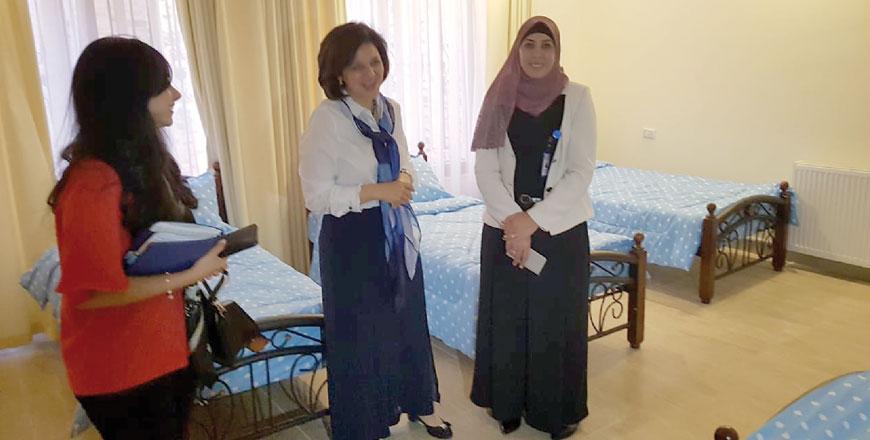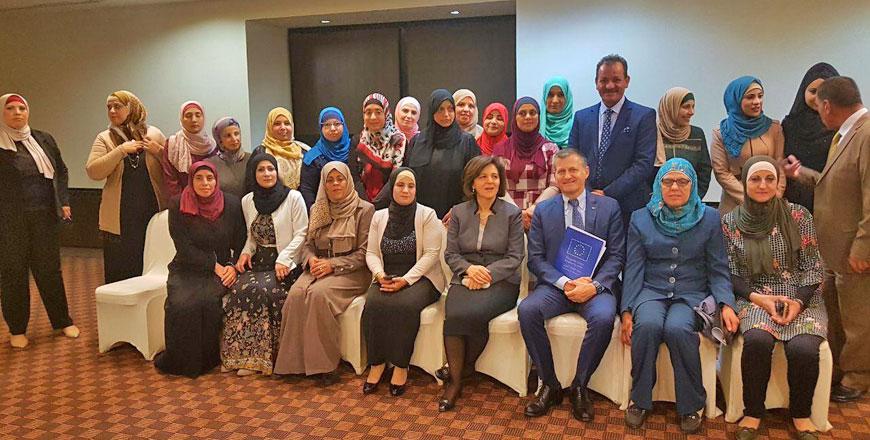You are here
Safe house provides sanctuary for women fleeing family
By Rana Husseini - Dec 30,2018 - Last updated at Dec 30,2018

Minister of Social Development Hala Lattouf (centre-front) and EU Ambassador to Jordan Andrea Matteo Fontana (3rd from right-front) pose for a group photo with activists and social workers training to run the Amneh House for women in Amman (JT file photo)
AMMAN — Shrouq was in her late 20s when she tried to shield her sister from her brothers’ axes and knives after they attempted to kill her for family honour.
In her mid-50s now, Shrouq recalls the horrific attack against her and her sister, who had delivered a baby out of wedlock, as if it was yesterday.
“I still remember to this day how my brothers asked my parents and other family members to leave the house, and then brought a trolley to our room that contained several knives and axes,” she told The Jordan Times.
Her 18-year-old sister died as a result of the vicious attack, and she ended up in hospital under tight security.
Six months later, Shrouq was discharged from the hospital and was to be immediately sent to the only women’s correctional facility in Jordan, upon orders by the administrative governor, as a way of protecting her from a possible second attempt on her life by her family.
“I spent 15 years of my life behind prison walls in order to be protected from my own family. I cried every day because for me those were bitter and dark days,” she said.
“I wasted most of my life in prison. I grew very old. I went there looking like a doll and I left looking like a very old lady.”
Shrouq said that all she could do in prison, every day, was sit and think. She hoped no other woman would face the same bleak destiny she and hundreds of other women had suffered.
“I wished every day that the top officials in the country — no matter what women did — do not send them to prison because it is a method of deprivation of our freedom, which forces us to live in tough conditions and to mingle with criminals,” Shrouq added.
In July of 2018, the first guesthouse to take in women whose lives are threatened in the name of family honour began receiving cases.
The state-of-the-art, “Amneh House”, (safe in Arabic), also called the “Guest and Rehabilitation House for Women”, was opened by former Minister of Social Development Hala Lattouf.
“This is an important day for Jordan because human rights and the dignity of women have always been our priority. We decided to open this house because we believe it is the right thing to do,” Lattouf, who inaugurated the facility on behalf of Prime Minister Omar Razzaz, told diplomats and officials on July 31.
Lattouf stressed that the imprisonment of women to protect them from their families was now a thing of the past.
Any new cases would be sent to the guesthouse by the relevant authorities and not to the Juwaida Correctional and Rehabilitation Centre (JCRC).
This would be their new temporary home until their cases are solved in the appropriate manner, Lattouf added.
Hundreds of women have been imprisoned at the JCRC for indefinite periods, and without being charged in what is termed “protective custody”. Some periods exceeded 10 years, during which women could not leave the facility without the administrative governor’s permission or a male guardian’s signature guaranteeing he would not harm her if she was released.
Dozens of women who were imprisoned at the JCRC for their own safety were gradually moved to the newly-established guesthouse to ensure a smooth and successful transition.
“Our main concern now is to ensure the safety and security of these women and help them get accustomed to this new situation,” said Raghda Azzeh, director of the new guesthouse.
Azzeh told The Jordan Times in a recent interview that “the idea is to basically provide more fair alternatives for women whose lives are in danger”.
Around 40 female employees affiliated with the ministry underwent special capacity-building training in May to prepare for newcomers and manage the facility.
The guesthouse will provide meals and other necessary items for women and their children, and is also equipped with several private rooms for women with children. The house includes a play area for children, rooms equipped with sewing machines, computers and hair salon equipment for residents to learn new skills.
The facility also encompasses several kitchens, balconies, a health clinic, sports equipment, a garden and rooms to receive cases. It is protected by both male and female police officers.
“We will receive any case that qualifies for our guesthouse. We will never turn our backs on anyone, even if we have to bring in extra beds to accommodate the additional cases,” Azzeh said.
Most of the women in protective custody were involved in cases of rape, adultery and incest, and fearing for their lives, left their family’s home voluntarily.
On some occasions, women were reportedly killed after being bailed out by family members, even after guarantees had been signed to inflict no harm on them. Around 20 women are murdered annually for reasons related to “cleansing family honour” in Jordan.
The executive director of the Mizan Law Group, lawyer Eva Abu Halaweh, who partnered with the ministry to train employees and help women who are in protective custody, said the facility is a “temporary safe house for women until their cases are solved in a peaceful manner”.
“We have been working with civil society, government entities and activists, since 2005, to find a decent and humane solution for these women other than having them spend many years of their lives behind bars. We are pleased that this day has finally come,” Abu Halaweh said.
“The new guesthouse will hopefully bring new hope and better protection for these women,” Abu Halaweh told The Jordan Times in a recent interview.
The guesthouse’s policy stipulates that women whose lives are in danger are entitled to be admitted to the guesthouse willingly at any time and during holidays, after being referred by the administrative governor.
The guesthouse, according to the policy, will be obliged to document their cases and provide them with the necessary legal, psychological, social, medical and recreational services.
The house can also receive children six years old or younger accompanying their mothers.
The services will be terminated in the event that women do not wish to stay, threaten other women residing in the guesthouse or if the problem of a given guest is resolved and there is sufficient evidence that her life is no longer in danger.
“During my 15 years in prison, I was always dreaming of smelling the soil and planting trees and roses. I am glad that I know no other woman in Jordan will be deprived of these small but important wishes,” Shrouq said.
“Thanks to the new guesthouse we now know for sure that no more women will be imprisoned in Jordan to protect them from their families,” she added. “There is a better place for them to start over.”
Related Articles
AMMAN — One year after the first guesthouse to take in women whose lives are threatened in the name of “family honour” opened its doors, exp
AMMAN — Minister of Social Development (MoSD) Hala Lattouf on Monday said that among the country’s top priorities is to ensure the safety an
AMMAN — Minister of Social Development Hala Lattouf on Sunday said women who are being imprisoned for their own safety for reasons related t


















